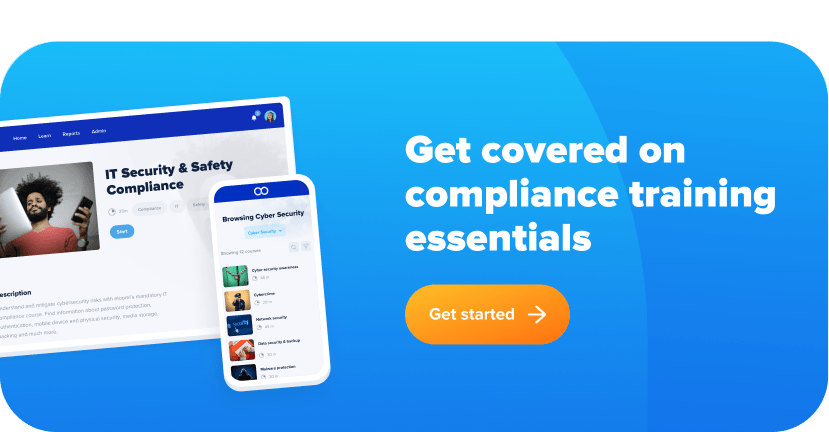Here’s what makes compliance training so confusing: there’s no clear mandate for training at the federal level that applies to every business.
Some industries have required training—Occupational Safety and Health Administration (OSHA) training for hazardous jobs, Federal Aviation Administration (FAA) training for public safety—but nothing that applies to every company. To make matters worse, some states require compliance training and others don’t.
To help you navigate this increasingly confusing and high-risk area of running your business, here’s a brief breakdown on what training is required and what’s recommended. Hint: we recommend any training that’s going to protect your business and your employees.
Why compliance training matters
Before we start, we need to understand why compliance training is vital to your business. To stay in business and keep growing, you need to have employees engaged with your company and customers. Compliance training helps to keep your employees working within the laws and regulations set out by federal and state governments and serves to keep employee morale high by reducing the likelihood of a toxic work environment.
Compliance training seems boring and unnecessary but consider that every employee who quits your company is a potential lawsuit. This is a risky and extremely costly gamble that you can significantly reduce the likelihood of occurring by conducting even minimal compliance training with your team.

How often should staff be trained in compliance?
If you are wondering how often staff should be trained in compliance, experts recommended that training should be completed at least annually, with additional training as needed for specific updates or changes in regulations. Annual compliance training sessions ensure your staff stays informed about the latest regulations and best practices, reinforcing their knowledge and helping to maintain a culture of accountability and adherence to standards.
Furthermore, organizations should be aware of annual compliance training requirements: data privacy training, for example, should be renewed each year not only to keep employees on top of the latest practices but also to keep the organization compliant with regulatory requirements.
By ensuring a workplace free of harassment, bullying, and toxicity, you can not only minimize your risk but also create a safer work environment, increase productivity, reduce absenteeism and turnover, and show your employees you respect them as individuals and support their needs. Ultimately, compliance training is just good business.
What compliance training is required by law?
Sexual harassment
Sexual harassment training and anti-harrassment training is intended to prevent unwanted sexual behavior in the workplace. It builds awareness of what constitutes sexual harassment and seeks to reduce the likelihood of your business suffering negative consequences from unwanted sexual harassment, keeping your workplace happier, healthier, and more cohesive.
The closest the federal government comes to mandating compliance training for all companies across all industries is for sexual harassment. The Equal Employment Opportunity Commission (EEOC) and the U.S. Supreme Court have strongly encouraged sexual harassment training and stressed its importance. But neither has taken the step to formally classify such trainings as required compliance training for employees.
Some states, however, have taken that additional step. As of the publication date, these are the compliance training programs per state that mandate sexual harassment training: Californi (for employers with 5 or more employees in the state), Connecticut (for employers with 3 or more employees in the state), Delaware (for employers with 50 or more employees in the state), Illinois (for employers with 1 or more employees in the state), Maine (for employers with 15 or more employees in the state), New York (for employers with 1 or more employees in the state).
We didn’t skip any states, the list is that small. Very few states mandate sexual harassment training, although in recent years, there has been a push to make this training more widespread.
Additionally, some states have requirements that supervisors and managers receive separate training on how to handle sexual harassment complaints. Oddly, some of the states requiring supervisory sexual harassment training do not require employee-level sexual harassment training. Other states only require sexual harassment training in certain industries or professions, like New Mexico which mandates training for all primary and secondary education providers.
Why it matters: Even in states where you’re not required to provide sexual harassment training, your company can be held liable for any sexual harassment. If you provide training, you may have an affirmative defense that limits or entirely removes your liability

What compliance trainings are recommended?
Anti-harassment & anti-discrimination
In states where sexual harassment training isn’t required, this training can take its place while including additional topics. If you are required to provide sexual harassment training, it’s good to keep that separate and documented.
Anti-harassment and anti-discrimination training define workplace harassment, bullying, and discrimination. It will cover strategies for preventing such workplace behavior as well as how to deal with violations. When you clearly define what is considered unacceptable behavior, you hold all employees to the same standard, which is a form of anti-discrimination in itself.
Diversity
Diversity and inclusion efforts by businesses have increased dramatically in recent years. This training will provide your employees with insight about their own biases—both known and unknown—and how to counter them to work effectively with colleagues from varying backgrounds.
Diversity training often goes hand in hand with anti-harassment training. It also includes details on how to operate in a more inclusive environment, welcoming people from different faiths, cultures, abilities, and beliefs.

Workplace safety
Safety training will vary depending on your industry. If you operate in a traditional office environment, your training will focus more on ergonomics, first aid, fire safety, and rendezvous points in case of emergency.
However, in more hazardous industries and professions, your workplace safety training may be more intense, and it may be required. For example, if you operate in the construction industry, you may be required to provide certain OSHA safety training.
Data protection & privacy
You might think this only applies to companies who collect and store customer or client data. Think again.
In today’s work environment, you collect and store your employees’ data on a regular basis. If you offer retirement benefits, you’re collecting confidential information about each enrolled employee.
This training will show you the difference between personally identifiable information and publicly shared data. It will also show you how to properly collect and store the data, and how to restrict employee access so a breach is less likely. Your employees want to know that the data you have on them is safe and, by having this training, you’ll convey the steps you take to achieve that goal.
Healthcare
Related to data protection and privacy, healthcare training is vital to any business. The Health Insurance Portability and Accountability Act (HIPAA) limits health information that can be disclosed without a patient’s consent.
This training is crucial for employers who offer health insurance to their employees. Running afoul of HIPAA can lead to serious fines but it also reduces the trust your employees have in you, making it more likely that you’ll soon deal with higher employee turnover and reduced productivity.
Human resources
Human resources (HR) training is one training that’s specifically designed for one group of employees, instead of everyone. Even if your HR department is small, your business will benefit from HR training so you can scale more effectively.
HR training ensures your company handles complaints appropriately, keeps records correctly, handles payroll accurately, and manages employee performance effectively among the many other tasks HR is solely responsible for doing and overseeing. Regulations abound for HR and employment laws. Your HR team must understand and follow these regulations accurately to reduce your company’s risk.
Compliance training required by state
As noted, every state has slightly different requirements for compliance training. This makes it even more crucial that you train your employees on the nuances of your state’s laws. That’s also what makes state-specific training so much more in-depth. There are countless sub-trainings that may be necessary, depending on your industry and the types of workers you have. Each state has its own set of compliance training programs designed to ensure that employees are well-informed and equipped to adhere to local regulations. Below is an overview of compliance training programs in several key states, highlighting their unique requirements and the importance of maintaining compliance:
- California compliance training program
- Connecticut compliance training program
- Delaware compliance training program
- Illinois compliance training program
- Maine compliance training program
- New York compliance training program
For every state, from employees to executives, you’ll need to ensure everyone understands the rules they need to follow. This is your company’s path to an affirmative defense.
What’s an affirmative defense?
We’ve mentioned this term a couple of times so let’s discuss it for a brief moment. An affirmative defense is a defense an employer can support through evidence which, if credible, will reduce or eliminate the employer’s liability.
Let’s consider an example. You have a supervisor who’s created a hostile work environment for an employee because of sexual harassment. If the employee did not engage in sexual behavior with the supervisor and was fired, demoted, or received any other adverse action, your company has no defense.
However, if no adverse action was taken against the employee and you can prove the following, you may prevail and reduce or eliminate your company’s liability:
- Your company provided both supervisor and employee sexual harassment training
- Your company reasonably tried to prevent and promptly correct the sexual harassment behavior
- The employee failed to reasonably take advantage of corrective opportunities provided by your company
Your next steps
Train your team. Training is proactive. If you train your employees incorrectly, you’re to blame and will bear the burden of the consequences. If you fail to train your employees on training required by your state, you’ll bear the burden of the consequences. To make matters worse, compliance training requirements by state and employment laws are constantly changing.
It’s important that you take proactive steps to ensure your employees are properly trained on required and recommended training necessary for them to do their jobs. To help you, partner with a training platform that does the hard work for you, so you can focus on your core business needs. With eloomi, we make sure your compliance training is up to date and contains accurate information to help guide and support your employees in their work.





